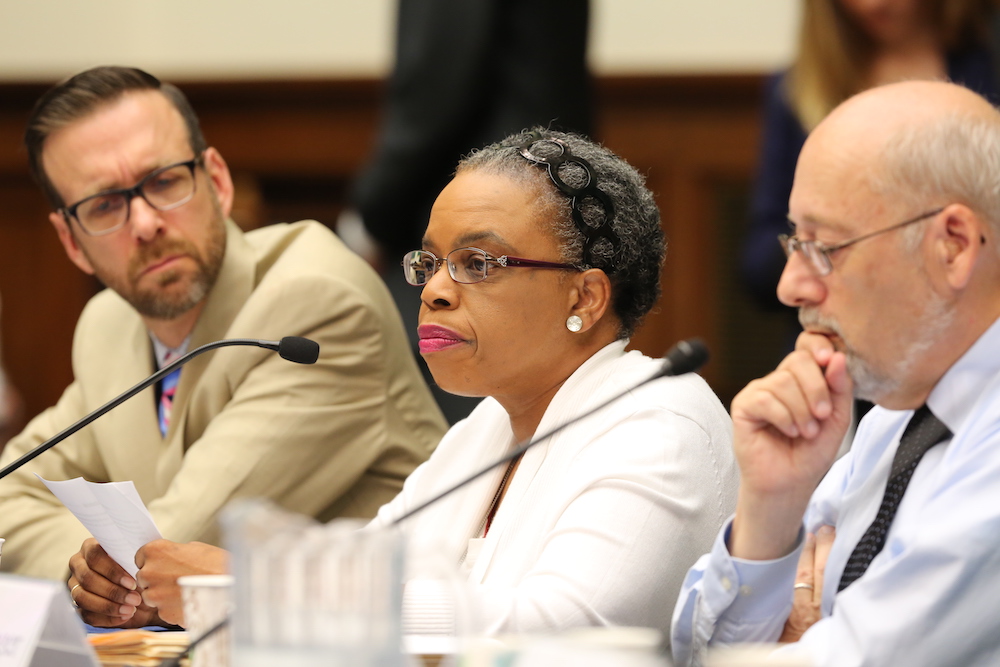Saying that "medicine is a noble profession," a Catholic physician told Maryland lawmakers that "physician-assisted suicide fundamentally alters the physician's role in society."
Dr. Marie-Alberte Boursiquot made the comments in testimony for a hearing on the End-of-Life Option Act under consideration again by the House Health and Government Operations and Judiciary committees. The measure has been repeatedly introduced in recent years and blocked in committee.
The measure would allow terminally ill adults who have six months or less left to live and who are mentally capable to receive doctor-prescribed medication to end their lives.
Boursiquot, a board-certified internist and fellow of the American College of Physicians, was one of several testifying against the measure Feb. 15. She shared her testimony with the Catholic Review, the media outlet of the Archdiocese of Baltimore.
She discussed the duties physicians have to their patients: acting in the patient's best interest; avoiding or minimizing harm; respecting a patient's autonomy; and promoting fairness and social justice.
Medical professionals have to safeguard the relationship between a physician and a patient and protect the most vulnerable in society, including children, the sick, the elderly, the disabled, the poor and others, said Boursiquot, who has been a practicing physician in Maryland for more than 20 years and was president of the Catholic Medical Association from 2016 to 2017.
"Medicalizing death does not address the needs of dying patients and their families," she said. "Physician-assisted suicide is not medical care. Physicians are committed to preserving life, not in taking lives."
Boursiquot, a parishioner at Baltimore's Basilica of the Assumption, noted a few of the fundamental flaws of the End-of-Life Option Act, including the lack of consideration for depression; failed attempts at suicide; and determining whether a patient is being coerced.
"There are those in the medical community who have already decided or are contemplating taking a neutral stance on this issue," Boursiquot said. "I ascribe to the thought of the Holocaust survivor and Nobel laureate Elie Wiesel, who once said, 'Always take sides. Neutrality helps the oppressor, never the victim. Silence encourages the tormentor, never the tormented.' I invite you to choose the side which respects the dignity of human beings in allowing them to die naturally."
Among those testifying in support of the legislation was Diane Rehm, a former NPR host.
She detailed the circumstances her 83-year-old husband, John, faced when he was terminally ill in 2014. She said he was ready to die, but his doctor informed him that his only option was to stop eating, drinking and taking medications, which would lead to his death within 10 to14 days.
"I sat by my husband's side as he slowly died," Rehm said in her testimony, which was shared with the Catholic Review by Compassion and Choices, a group that supports physician-assisted suicide. "Watching John in those last 10 days of his life made me angry. Why did our laws infringe upon an individual's decision to peacefully die, when dying was inevitable within a few months?"
The Maryland Catholic Conference opposes the bill, which was introduced Jan. 30 and is sponsored by Democratic Del. Shane Pendergrass. The bill has nearly 50 co-sponsors.
"Our state has repeatedly rejected this group's agenda and with good reason: assisted suicide threatens Maryland's most vulnerable, putting those with disabilities, the elderly, our veterans and those battling opioid addiction at grave risk," Jennifer Briemann, director of the Maryland Catholic Conference, which represents the state's Catholic bishops on public policy matters. "As Catholics, we stand firm with our partners across the state to strongly oppose this proposal."
"It is impossible to legislate proper safeguards to protect Maryland from the dangers of legalized physician-assisted suicide," she added in a statement released a day before Pendergrass introduced the bill.
Across the country, lawmakers in New Mexico in both the state House and Senate are considering a measure to legalize assisted suicide.
"We must protect the dignity of the human being at all stages of life. This proposed legislation creates a detrimental consequence of death that may be based on human error," the New Mexico Conference of Catholic Bishops said in a recent statement.
"These two bills would allow for the assisted suicide of people who have been given a prognosis of six months to live, which only has a 20 percent accuracy of prediction of death within said six months," the conference explained. "This means that patients are subject to an 80 percent chance of an inaccurate diagnosis resulting in life taken based on human error."
When the state's Catholic bishops "supported the repeal of the death penalty, arguments were made by legislators that the death penalty was not acceptable because of the chance of human error," the conference added. "We cannot have legislators ignore the greater chance of error in assisted suicide."
It said the "solution to suffering is not the elimination of the sufferer, but rather quality health care and palliative care. This is the area where we should all come together to support remedies such as health care for all."
The state Catholic conference called it unethical for New Mexico to offer the terminally ill "a prescription for death" and at the same time "stand idle and see residents of our state go without health care coverage or adequate health care coverage throughout their life," especially for those facing life-threatening illnesses.

